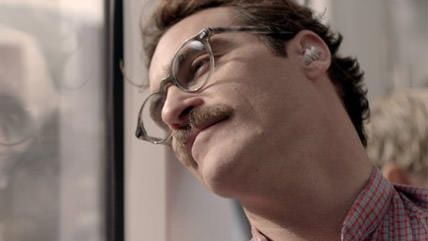Her
Joaquin Phoenix and the woman who wasn't there.

Theodore Twombly, lonely guy, may have found the perfect girl. She lives inside his computer. Her name is Samantha, and she is the voice of Theodore's new operating system. She's really something. At first she was all small talk: "Good to meet you," "Do you want to know how I work?" Very Siri. Then things got more interesting. "At every moment, I'm evolving," she informed Theodore. "You'll get used to it." Will he?
Spike Jonze's Her is an enchanting tale of love among our many machines. The movie is charming and funny and a little unearthly. It features yet another uncanny performance by Joaquin Phoenix, and an improbably dazzling one by Scarlett Johansson, who never actually appears.
The story is set in a future not far ahead of our own (a period in which the fashion in menswear inclines toward high-waisted trousers). Theodore (Phoenix) is an underachieving writer employed by a company that provides handwritten letters for clients who can't be bothered to write their own. He is being divorced by his wife, Catherine (Rooney Mara), a successful author. He is bereft. At night he cruises Internet chat rooms in search of romantic connection, but encounters only sex maniacs. His broken heart is scabbing over. "Sometimes," he says, "I think I've already felt all that I'm gonna feel."
Then, booting up his computer one day, he encounters Samantha (Johansson). With all the resources of the Web at her non-existent fingertips, Samantha quickly learns how to make herself of service. She starts by sorting through Theodore's emails—saving this, deleting that. Soon she's proofreading the letters he writes for work. Before long they're stepping out together (Samantha travels by phone). Theodore is smitten. He tries to explain this unusual new relationship to his only real friend, a videogame designer named Amy (Amy Adams). When he's with Samantha, he says, "I feel cuddled."
Some of this has literary overtones, recalling the Mark Twain short story "Eve's Diary" as well as the traditional science-fiction theme of sentient machines. But Jonze, working for the first time from his own script, creates narrative inventions that are unique. (The question of virtual sex, posed by Samantha, is resolved in a novel way.) And the actors do some of their best work. Phoenix, who's in every scene, never falters in conveying the dreamy confusion of a man for whom life is a puzzle whose pieces may never fit together. And Johansson, who's not in any scene, is a wonder, dancing around Theodore's befuddlement with a voice at one moment sparkling and sweet, at others hurt and even irritated. (Samantha's lines were originally read on-set by Samantha Morton; when Jonze brought Johansson in to re-do them, he adjusted the movie to accommodate her extraordinary performance.)
There's also strong support by Mara—who's only in one scene (apart from a few flashbacks), but hits telling notes of conflicted affection and regret—and by Adams, giving a full-hearted account of a woman with love problems of her own who's open to alternatives. (Her character assures Theodore that he's not weird—she has another friend who's also dating an OS.) And cinematographer Hoyte Van Hoytema (Tinker Tailor Soldier Spy) wraps the L.A. exteriors in a gauzy haze that's ideal for the story's understated otherworldliness.
The movie has more on its mind than the old question of "What is love?" In a bracingly original way, Jonze suggests that whatever the future of digital evolution might hold in store for human romance, the danger of heartbreak will always remain, along with its attendant torments of desperate yearning and unfocused jealousy. "You helped me to discover my ability to want," Samantha tells Theodore. Want what, he wonders.
